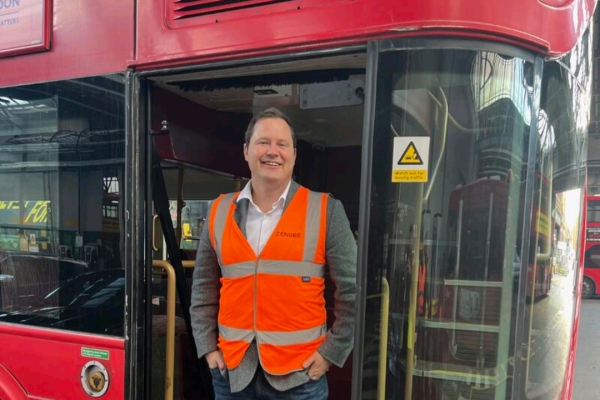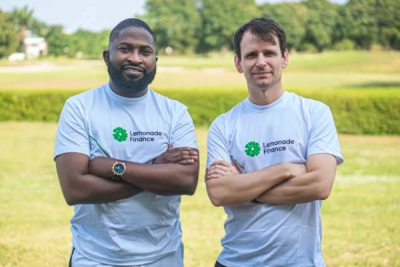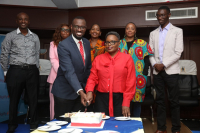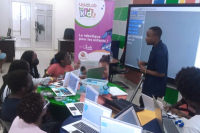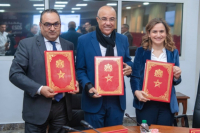South African logistics startup GoMetro announced on Wednesday, November 29, the successful completion of an $11.4 million Series A funding round. According to Justin Coetzee (photo), GoMetro founder and CEO, the funding will be used to accelerate the company's growth and expansion plans, with a focus on developing its engineering teams, distribution, and partner management teams as well as enhancing the management of electric buses and trucks.
FSAT Labs provides a comprehensive suite of services, including incubation, open innovation, training, and startup acceleration, to nurture and empower entrepreneurs. Since its inception, it has fostered the continental and international success of numerous companies.
French South African Tech Labs (FSAT Labs) is a digital startup incubator and accelerator based in Century City, Cape Town, South Africa. Established in 2016 by Methys, a digital innovation and consulting firm, and the Small Enterprise Development Agency (Seda), it is committed to propelling early-stage digital startups across Africa.
Led by economic development and SME startup support expert Ndileka Zantsi, FSAT Labs provides a comprehensive ecosystem of support services for startups. The services include 400 square meters of dedicated space for startups to collaborate, innovate, and grow; equipping entrepreneurs with the digital skills and knowledge they need to succeed in the ever-evolving tech landscape; mentoring and coaching startups with personalized guidance and support throughout their journey; and tailored software development and research services to meet the specific needs of both enterprises and technology startups.
FSAT Labs offers two flagship programs to empower startups at every stage of their growth. Its six-month incubation program helps startups transform their ideas into businesses and get their first clients by providing workspace, mentoring, access to a network of experts and partners, and convertible loan financing. The program is divided into three phases. The first phase is the pre-incubation stage, a 4-week period during which the entrepreneur’s idea is validated. The second phase is the 6-month incubation period during which intensive support and guidance are provided. The last phase is the launch stage where startups are equipped to enter the market with confidence.
FSAT Labs also offers a 24-month acceleration program that propels startups to pre-seed or seed funding by offering comprehensive support, from mentoring to resources, throughout their growth journey.
Recognizing the importance of women's participation in the entrepreneurial world, FSAT Labs has established the Khwezi Lodestar Program, an initiative that aims to digitally develop 20 startups founded by women in each cohort. The program provides grants for software licenses and digital platforms, technical support, and mentoring led by accomplished businesswomen.
FSAT Labs has supported several startups, including Gamer's Territory, a technology hub to promote gaming in Africa; Lawyered Up, an African legaltech startup committed to accessibility, social impact, and gender equality within the legal industry; and HourlyRate, an AI-powered freelancing platform.
It is also supported by several organizations and institutions. These include Technology Innovation Agency (TIA), AfricArena, Old Mutual, French Tech Entrepreneurs Cape Town, Enrich in Africa, Silicone Cape Initiative and La French Tech.
Melchior Koba
Young Africans often dream of pursuing their higher education at international universities. But, they sometimes need more information, which makes them waste time and resources. In Madagascar, Tsanta Rakotoarimanga has developed a platform that connects students with mentors who provide guidance and support throughout their educational journey to address that issue.
Tsanta Rakotoarimanga (photo) is the founder and CEO of Mapwess, an online platform that helps students access quality higher education. He holds a bachelor's degree (2019) in finance from Université des Mascareignes in Mauritius and a master's degree in international strategy and management (2023) from Paris-Saclay University.
Driven by his own experiences navigating the complexities of studying abroad, Rakotoarimanga founded Mapwess in 2020 to empower African students to pursue their dreams of higher education at prestigious international universities. The platform connects students with experienced mentors who provide personalized guidance and support throughout their educational journey, from orientation and enrollment to settling into their new environment. With the platform, Rakotoarimanga aims to help 10,000 students realize their dream of studying abroad.
"The idea for Mapwess stemmed from our own challenges in preparing for our studies abroad," Rakotoarimanga explained. "We realized that many students face similar struggles, and we wanted to create a solution that would make the process more accessible and less daunting."
Prior to launching Mapwess, Rakotoarimanga established Dream Studio Agency, a student placement agency that successfully helped numerous young Africans secure placements at renowned institutions. He attributes his entrepreneurial success to the support he received from startup incubators like Orange Fab Madagascar and Zafy Tody, which provided him with valuable resources and mentorship in a context where entrepreneurship was not an easy task in Madagascar and financial institutions and private investors were not confident enough to back him.
Rakotoarimanga's dedication to empowering African students has earned him recognition and accolades, including the third prize in the national stage of the Orange Social Venture Prize in Africa and the Middle East (POESAM) in 2020. In 2021, he was selected as one of Africa's best young entrepreneurs for the Anzisha Prize. This year, he got the opportunity to represent Madagascar in the YALI (Young African Leaders Initiative) program for the Southern African region.
Melchior Koba
Dedicated to fostering the development of African nations, the African Development Bank (AfDB) is expanding its network of partnerships to empower Africa to fully harness the potential of emerging technologies.
On Monday, November 27, the African Development Bank (AfDB) announced a strategic partnership with the US Commercial Service, a global network of trade experts dedicated to promoting foreign direct investment in the United States. This collaboration, unveiled during the Africa Tech Festival in Cape Town, South Africa, aims to foster a series of dialogues on how US digital innovation can contribute to achieving development goals in Africa.
"We are at a turning point in Africa's technological advancement. By bridging insights from the U.S. private sector with Africa's vibrant markets, we aim to drive innovation and economic growth. This partnership is a testament to that mission," said Ashley Ndir, senior U.S. Commercial Liaison to the African Development Bank.
Under the terms of this partnership, the two parties will explore avenues for African governments to collaborate with US technology companies to advance their economies. Additionally, they will examine how US businesses can capitalize on emerging opportunities in Africa's emerging markets.
Discussions will focus on key themes such as embracing emerging technologies, enhancing internet access, developing digital skills, and establishing a regulatory environment conducive to innovation.
This initiative aligns with the AfDB's digital development strategy, which is designed to support African countries in achieving their digitization goals. As part of this strategy, the AfDB invested $2 billion in digital infrastructure, including “regional and national broadband development, creating favorable policy environments for private sector investments, scaling digital skills, and nurturing innovative enterprises.”
Samira Njoya
LemFi, a Nigerian fintech company specializing in money transfers, recently announced the suspension of its operations in Ghana. The decision follows a recent announcement by the Bank of Ghana which identified several entities operating in the country without the required licenses
A fervent advocate for technological advancement, he has been instrumental in organizing numerous hackathons and innovation competitions across diverse technology domains. He has also founded a tech platform aimed at revolutionizing tourism in Africa.
Prince Youlou (photo) is a Congolese web developer and IT consultant. He graduated in Project Management (2010) and Computer Science (2011) from the IT Business Campus, further enhancing his skills with a certificate in information technology from Huawei University (in 2018).
In 2020, alongside Orion Massamba Wambert, Prince co-founded Niochi, where he serves as the CEO. Meaning "bee" in the local Lari language, Niochi is on a mission to make tourists feel at home when visiting African countries. For that purpose, the startup introduced a mobile app that empowers users to access detailed information on locations, public ratings, and satisfaction indexes for hotels, restaurants, and bars, helping them find the perfect spot.
Prince Youlou's motivation for Niochi stemmed from personal experiences: "Over the years, we've tried many tools and none of them helped us find the best spots in Congo and some of the African countries we've stayed in. That's how we decided to create Niochi, to give people access to detailed information on entertainment venues, accommodation, personal care, and wellness services across the continent," he explained in 2020.
Beyond Niochi, Prince has been actively involved in the tech community. Since 2015, he has been the president of Fongwama, an African community of free software developers. In 2019, he took on the role of leading research and development projects for UNDP Acceleration Labs.
His diverse experience includes serving as the project manager for SanteHack, a healthcare innovation hackathon for Equatorial Congo Airlines in 2016. He has also organized impactful hackathons such as Hack4Food –an initiative by the World Food Program (WFP)- in 2017 and Médiathon –an innovation competition in the information production and dissemination sector organized by the OIF– in 2018.
Melchior Koba
Digify Africa, a leading South African provider of digital skills training, has launched its Digify Pro program in Nairobi, Kenya. This initiative is undertaken in collaboration with Meta, the American technology giant that owns the Facebook social network. The program aims to foster digital literacy and equip young Kenyans with the skills they need to thrive in the digital era.
In the Republic of Congo, Yekolab aims to train the next generation of technological leaders in Africa. It incubates young entrepreneurs and introduces children to new technologies.
Established in February 2015 by ICT expert Max Bonbhel, Yekolab is a center of excellence and training in new technologies and emerging trades in the Republic of Congo. The center's primary mission is to transform the creative ideas of young Congolese individuals into viable and bankable businesses.
Yekolab offers comprehensive incubation and training programs, covering web development, mobile development, enterprise application development, embedded technology, and even programming for children. The center's Y-Incubateur program specifically supports young entrepreneurs, providing them with essential technical resources to thrive in an increasingly competitive market.
Beyond its incubation initiatives, Yekolab houses Y-Lab, a research center fostering technological innovation among Congolese creators. The center is also actively developing Yekolab for Kids, a training program designed for children aged 7 to 17. This program equips children with programming skills and the ability to build robots or automated machines. The 2022 edition of Yekolab for Kids graduated 73 children.
With centers in Brazzaville and Pointe-Noire, Yekolab receives crucial technical and financial support from key partners, including the national telecoms regulator ARPCE, Airtel Congo, and JCertif a non-profit organization dedicated to promoting innovation through ICT.
African countries are actively forging strategic partnerships to remain abreast of the swiftly evolving global technological landscape. In the same vein, Morocco recently inked a memorandum of understanding with a U.S. Tech giant.
On Monday, November 27, Morocco's Ministries of Higher Education and Digital Transition signed a memorandum of understanding (MoU) with American technology giant Oracle, marking a significant step towards enhancing digital skills development in the kingdom's higher education landscape.
The MoU aims to empower professors and students with access to comprehensive training programs, learning resources, and software developed by Oracle. This collaboration aligns with the Kingdom of Morocco's ambitious digital transformation goals, as outlined in its digital transformation strategy, Maroc Digital.
"This memorandum of understanding forms part of the Ministry of Digital Transition and Administrative Reform's vision to increase the number of skills and talents trained in digitalization professions. [...] This will enable us to support our country's digital transformation as a leading producer of digital solutions at regional and continental levels, while also meeting the needs of national and international investors," reads a joint release from both ministries.
Under the terms of the MoU, Oracle will provide Moroccan institutions with access to its Oracle Academy, a global education program that has been empowering students for over two decades. Through this partnership, Moroccan students will gain hands-on experience with Oracle's technology stack, preparing them for successful careers in the digital sector.
The MoU aligns with Morocco's commitment to Maroc Digital, which calls for the annual training of 45,000 digital talents and the conversion of 50,000 young people to digital professions. This initiative aims to position Morocco as a global hub for innovation and digital excellence.
On completion of the training courses, Moroccan students will be able to obtain Oracle professional certifications in various technological fields, enhancing their career prospects and making them highly sought-after professionals.
Adoni Conrad Quenum
In Africa, the healthcare landscape is plagued by a shortage of adequate infrastructure and qualified medical professionals. This severely hinders accessibility and the quality of healthcare services but, with the advent of artificial intelligence (AI), players hope to alleviate those critical challenges.
The International Finance Corporation (IFC), the private sector financing arm of the World Bank Group, recently announced a partnership agreement with Senegalese e-health startup Kera Health Platforms, to address the critical shortage of healthcare professionals and facilities in West Africa. This collaboration aims to leverage technology, particularly artificial intelligence (AI), to enhance healthcare accessibility and outcomes for millions of people across the region.
"As Africa stands on the cusp of a demographic boom, harnessing the power of technology in healthcare is not just an opportunity; it is an imperative.[...] Thanks to this collaboration with IFC, we are poised to accelerate the integration of AI, enhancing healthcare accessibility and outcomes across the continent," said Moustapha Cissé, founder and CEO of Kera Health Platforms.
Under the partnership agreement, IFC will provide financial support to Kera to further develop its AI-powered solutions for managing electronic health records (EHRs), lab results, pharmaceutical data, smart medical records, and health insurance products.
According to IFC officials, the initiative is part of the corporation’s investment strategy to address an insufficient number of healthcare professionals and facilities, as well as low health insurance coverage in Africa. "With its boundless potential, the African continent faces an acute healthcare challenge. It bears the weight of one of the lowest doctor-population ratios in the world, with about 1.5 medical professionals per 1,000 individuals. In Senegal, as of 2020, there was an average of less than one physician per 10,000 people," an IFC release explains.
In such a context, the technology developed through this partnership will significantly improve healthcare delivery at reduced costs by making crucial information readily accessible to patients, healthcare professionals, and other stakeholders.
Samira Njoya
More...
African tech ventures can apply for the Africa Tech Summit (ATS) Investment Showcase to be held in Nairobi on February 14th-15th, 2024. The showcase is a key element of the annual Africa Tech Summit, providing selected ventures with the chance to present innovative ideas to a diverse audience of local and international investors.
Ventures must be African-based, with an innovative, scalable product, and at least one African co-founder. Applications are open until December 19th, 2023.
Over the past few years, AI has been the focal point in global tech news. With its ever-expanding applications, there is a growing imperative to consider and address the security aspects associated with its widespread usage.
In a landmark move to bolster the safety of artificial intelligence (AI), 18 countries around the world have signed an agreement outlining a comprehensive framework for developing and deploying secure AI systems. The 20-page document, known as the Guidelines for Secure AI System Development, stipulates that companies involved in the development, deployment, or commercialization of AI must design their systems with inherent security measures to safeguard users and the public from potential harm.
"The release of the Guidelines for Secure AI System Development marks a key milestone in our collective commitment by governments across the world to ensure the development and deployment of artificial intelligence capabilities that are secure by design," said Jen Easterly, Director of the U.S. Cybersecurity and Infrastructure Security Agency (CISA).
This groundbreaking agreement follows three weeks after the inaugural international summit on AI, held from November 1 to 2 at Bletchley Park, England. It demonstrates global leaders’ will to proactively address the challenges and opportunities presented by the rapid advancement of AI technologies.
Beyond the core principle of "secure design," the agreement encompasses a range of recommendations, including Enhanced system security to prevent cyberattacks and unauthorized intrusions, Robust data protection measures to safeguard sensitive information, and Rigorous oversight of software suppliers to ensure compliance with security standards.
The 18 signatory nations include the United States, the United Kingdom, Italy, the Czech Republic, Estonia, Poland, Australia, Chile, Israel, Nigeria, Singapore, Japan, South Korea, Norway, France, New Zealand, Canada, and Germany. Notably, China, a major player in AI development, was excluded from the agreement due to ongoing U.S. sanctions.
Samira Njoya
Through its pre-incubation, incubation, and acceleration programs, Innov'Lab provides resources and support to Comorian entrepreneurs, contributing to economic growth and job creation in the country.
Innov'Lab, a business incubator established by the Union of Chamber of Commerce, Industry & Handicrafts of Comoros (UCCIA), is dedicated to fostering and supporting innovative project leaders across various sectors, including the social and solidarity economy, digital, agrifood, tourism, and the environment.
Founded in February 2017, Innov'Lab assists project holders in their endeavors to secure funding, navigate legal formalities, develop effective communication strategies, and enhance their management and accounting skills.
The incubator offers a comprehensive range of support programs tailored to the specific needs of aspiring entrepreneurs. Its pre-incubation program provides project holders with 10 days of intensive coaching or four months of ongoing support, enabling them to refine their ideas and gain valuable insights into the entrepreneurial journey.
Innov'Lab's incubation program, spanning two years, offers startups personalized guidance and mentorship, empowering them to develop their business concepts and prepare for market entry. Established companies can also benefit from Innov'Lab's accelerated growth program, which facilitates fundraising, branch expansion, and internationalization strategies.
Participants in Innov'Lab's programs gain access to a robust network of partners, including financial institutions and social enterprises, as well as various financing instruments. They also benefit from Innov'Lab's expertise in social media marketing and access to its network of mentors.
Innov'Lab provides a dedicated coworking space, fostering collaboration and knowledge sharing among startups. The incubator also offers conference rooms equipped for meetings and professional events, creating a conducive environment for networking and business development.
Since its inception, it has successfully incubated over 60 companies, provided training and support to over 400 aspiring entrepreneurs, and organized more than 10 events. The incubator collaborates with a range of technical partners, such as Meck Moroni for credit facilitation, the SHINOON platform for crowdfunding campaigns, and ORTC for media coverage.
Melchior Koba
In a statement issued on Monday, November 27, the International Telecommunication Union (ITU) reiterated its support for Ethiopia's digitization efforts. "We work in tandem with the government as the country has a national digital strategy. We work with them and then we address all of the specific requests that come to ITU and that is how we actually work in Ethiopia and the entire continent," explained Anne-Rachel Inné (pictured), ITU Regional Director for Africa.


